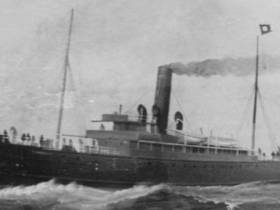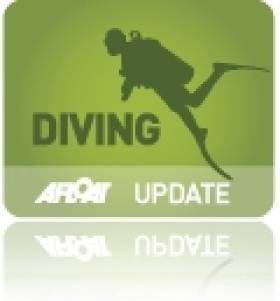Displaying items by tag: SS Dundalk
Isle of Man Divers Return Iconic Ship's Bell from Wreck Site of S.S. Dundalk
Dundalk is where a team of divers from the Isle of Man visited the Co. Louth port town so to bring the bell of the steam ship flagship, S.S. Dundalk back to a grateful town.
As EnergyFM reports, divers of Discover Diving based in Port, St. Mary, on the Manx south coast, were guests of honour of Dundalk’s Louth County Museum.
Artefacts of the Glasgow built flagship of the Dundalk and Newry Steam Packet Company were retrieved from the wreck. They consist the bell and its wrought-iron hanger, a porthole and a washbasin which were handed over to the county museum.
As Afloat previously reported, S.S. Dundalk during WWI was attacked on 14th October, 1918 by a German submarine during a return trip from Liverpool’s Collinwood Dock to Dundalk. The cargo ship's main trade was cattle, produce and also the carriage of passengers.
The torpedo attack led to the sinking of the 234ft long merchant ship and claimed 21 people. Only 12 survived, some of which were brought to Douglas from the incident that took place just weeks before the end of World War 1 and of the crew, they mostly were local to the Dundalk area.
On the 100th anniversary of the sinking, a committee of descendants of the crew, travelled to the Isle of Man to unveil a memorial clock on the Castletown River waterfront. The clock is in memory to those who tragically lost their lives.
For more,Energy FM reports more on the return of the ship's bell.
Also in the centenary year, Afloat reported of a ceremony held on board the Isle of Man Steam Packet's Mannanan which saw the fast ferry take a special detour to the wreck site some 60 miles offshore.
On the 92nd anniversary, the Dundalk Sub Aqua Club divers carried out a commemorative dive to the wreck site. The divers laid a plaque of remembrance which Dundalk town council had sponsored.
#CoastalNotes - The economic, emotional and communal effects is encompassed in an exhibiton about the sinking of the SS Dundalk 100 years ago which was officially launched recently at the County Museum, Dundalk, by UK Defence Attaché, Colonel Darren Doherty.
The SS Dundalk, a 235-foot-long merchant ship, writes the Dundalk Democrat was on her return trip from Liverpool’s Collinwood Dock to Dundalk Harbour on 14th October 1918 when she was torpedoed by a German submarine. The attack and subsequent sinking of the ship claimed 20 lives - 19 crew and one passenger, most of whom were local to Dundalk and surrounding areas.
The ‘SS Dundalk’ exhibition explores topics such as Louth’s booming port trade in the early 1900s, German WWI strategies, life in Dundalk during the war, and the effect of the loss of life on the victims’ families and friends.
To read more click the newspaper link here
Another Tragedy: The Sinking of SS Dundalk On October 14, 1918
#ssDundalk - Only four days after the sinking of RMS Leinster, another Irish Sea steamer S.S. Dundalk was torpedoed on 14th October 1918 just weeks before the end of World War 1.
As the Dundalk Democrat writes, twenty lives were lost and there were twelve survivors.
The ship T.S.S. Dundalk was built in Glasgow in 1899 at a cost of £40,000, as a flagship for the Dundalk and Newry Steampacket Company. She was too big for the Newry Canal and operated from Dundalk, she was 235 ft long powered by a triple expansion engine and could be encouraged to reach a speed of 16 knots.
Her main trade was in carrying cattle and produce from Dundalk to Liverpool and other goods on the return journey. She also carried passengers.
The newspaper details more on this tragedy, click here.
Dundalk Divers Pay Tribute to 20 Lost on SS Dundalk in 1918
On the 14th of October 1918, 20 people from Dundalk lost their lives aboard SS Dundalk when it sunk 60 miles south of the Isle of Man writes Timmy Carey. Earlier this year to mark the 92nd anniversary of the loss a number of Dundalk Sub Aqua Club divers carried out a commemorative dive to the wreck and laid a plaque of remembrance sponsored by Dundalk town council.
The team also placed an air tight capsule containing objects from the relatives of the survivors and those lost on the tragic ship.
Some artifacts were removed from the wreck and brought home to Dundalk and the team donated them to the local museum where they made a presentation of the expedition and showed some underwater footage of the wreck in its current state. The presentation was held on 14th October to mark the 92nd anniversary of the sinking and the team were joined by some relatives and members of the public for an emotional night with prayers and music provided by Fr Clem McManus a local Redemptorist Priest.
Read or hear the story of the SS Dundalk on their website HERE
Photos below courtesy of Paddy Agnew, Dundalk Sub Aqua Club
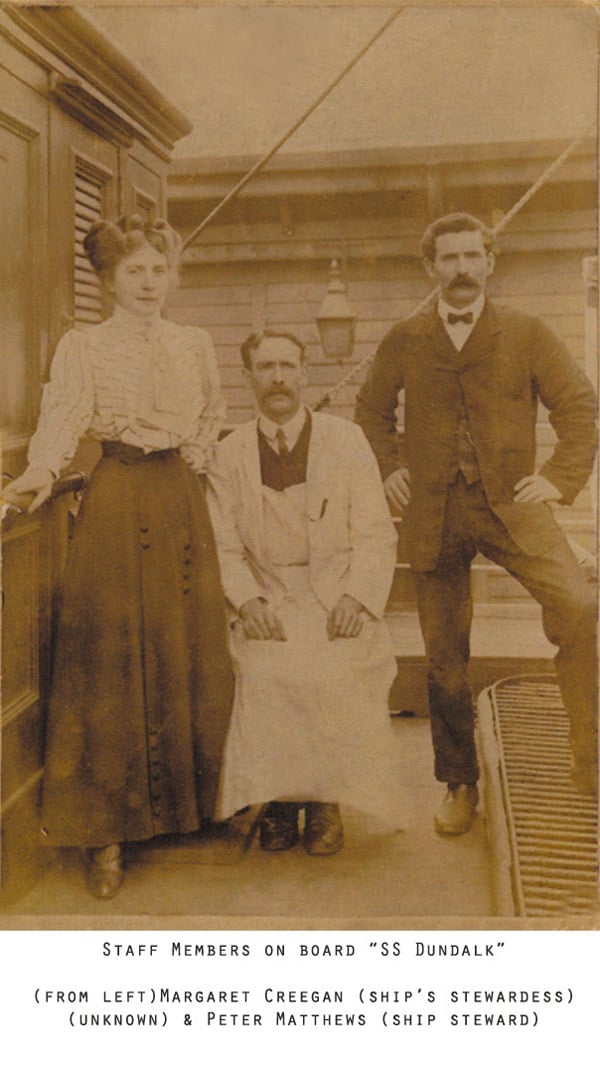
Local townsfolk who were lost on The SS Dundalk
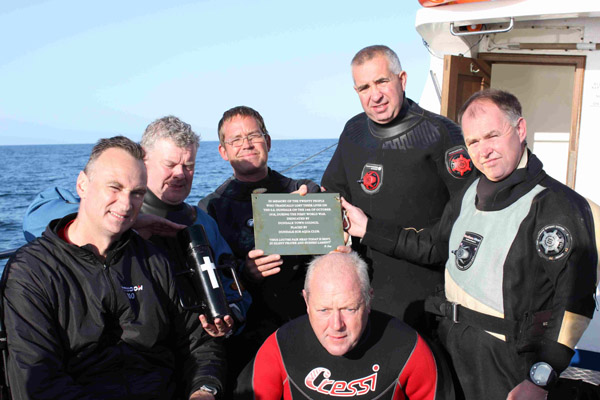
Members of Dundalk Sub-Aqua dive team before making their descent to the wreck of the SS Dundalk
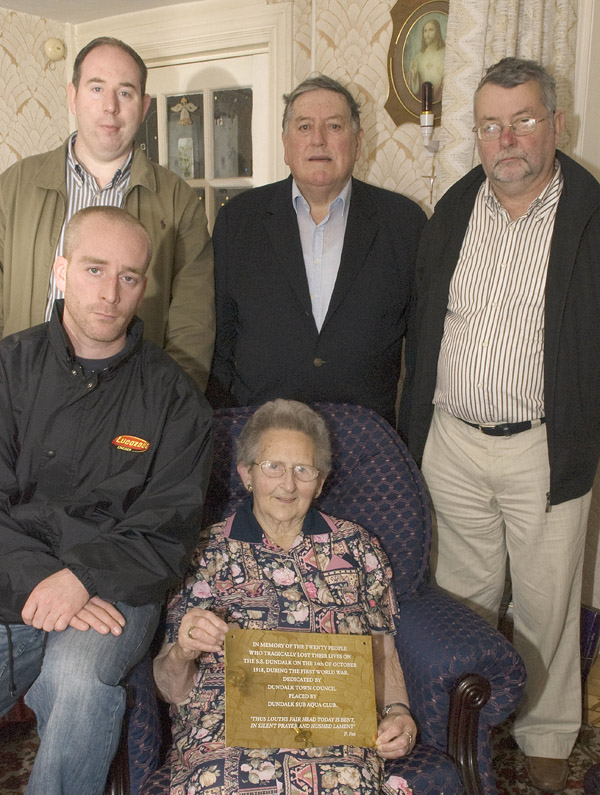
Dundalk hosts Merchant Seamen Exhibition
The photographic collection feature over 350 identity cards of Dundalk men who served in the merchant navy between 1918-1921. The cards include personal details, foreign voyages and most importantly, a passport style photo of each seaman.
The exhibition also provides an insight into the history and nature of maritime activity in Dundalk, noting the contributions of several families in the area, as well as highlighting the fate of the SS Dundalk sunk by a U-boat in October 1918.
An accompanying 24-page booklet has also been produced. For further information and copies of the booklet are available from the County Museum or may be downloaded from the website www.dundalkmuseum.ie Admission to the exhibition is free.


























